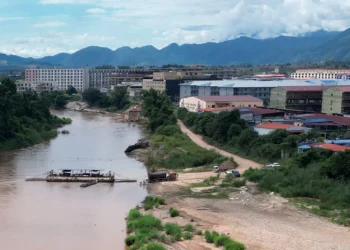Lacking sufficient revenue to fund its expenditures on the military, the Myanmar junta has turned to borrowing, relying on its cronies’ purchases of treasury bonds to cover the costs.
Myanmar’s military regime has been forced to resort to this new source of financing amid a miscellany of economic woes since the military coup of 2021: the departure of major multinational companies, suspension of foreign development aid and loans, decline in manufacturing production, decrease in export earnings, absence of investment from abroad, and the choking off of once-reliable revenue channels by international sanctions.
Myanmar Now has found that domestic private banks including Kanbawza Bank, Ayeyarwady Bank, and Yoma Bank have been collaborating with the military council–against their own apparent economic interests–by buying treasury bonds worth billions of Myanmar kyat.
Treasury bonds and treasury bills serve as a means to borrow money from the public by selling interest-bearing certificates of deposit with a promise to repay the buyer at a later, pre-specified time (the bond’s “maturity”), giving investors a means to buy and ultimately realise a return on the debt of a sovereign state.
In Myanmar, these bonds are issued by the Treasury Department, which operates as part of the junta-controlled Ministry of Planning and Finance, and are sold by the Central Bank of Myanmar (CBM).
As outlined in the central bank’s 2021 fiscal year report, treasury bills and bonds are sold directly to state-owned banks, private banks and securities companies, and sold to insurance companies and individual investors by securities companies.
Shortly after the coup in 2021, when banks closed at the height of the anti-junta protests, public participation in the junta’s treasury bond auctions almost came to halt. However, over time, banks resumed their purchases of the bonds.
More recently, according to information from the regime’s treasury department, the junta conducted 46 auctions of treasury bonds and bills between April and July of this year, with sales reaching a total value of 17.8 trillion kyat (US $8.5bn).
According to Tin Tun Naing, Minister of Planning and Finance for the publicly mandated National Unity Government (NUG), which operates as a shadow government opposing the coup regime, the value of treasury bonds and bills issued by the military council since the coup is more than 20 trillion kyat (US $9.5bn).
For the current fiscal year, the junta’s military expenditure is just over 5.6 trillion kyat (US $2.7bn), equal to about a third of the value of the treasury bonds and bills sold.
According to a World Bank report released at the end of June, Myanmar’s budget deficits have increased under the military council, coming to around 5.4 percent of GDP (gross domestic product) in the fiscal year that ended in April 2023.
The bulk of the sales of treasury bonds and bills was to state-owned banks and private banks owned and managed by ultra-wealthy businessmen close to the military junta, commonly referred to as “cronies.”
Tin Tun Naing noted that the sale of bonds has become the military council’s chief source of financing, meaning that the major domestic banks buying those bonds, whose assets consist primarily of money deposited by ordinary Myanmar citizens, are effectively using the public’s money to fund the military council’s war effort.
“Who bought the treasury bonds and treasury bills sold by the terrorist army? Domestic private banks purchased them. They bought those treasury bonds and treasury bills with the money deposited in the banks by the general public,” said Tin Tun Naing.
Who is filling the military council’s coffers?
A crowd of ultra-wealthy donors with close personal and business connections to the junta gathered in Naypyitaw in late June, each giving hundreds of millions of kyat for the ongoing construction of a massive statue of Buddha, with donations ultimately totaling more than 16 billion kyat (US $7.6m).
Military regime chief Min Aung Hlaing had initiated the project to symbolise his role as protector of Myanmar’s majority religion. Among those pledging contributions were owners of the country’s biggest financial institutions, representing a virtual who’s who of the cronies enabling the regime’s deficit spending by buying its bonds.
While the junta’s treasury department has released some information about the bond auctions’ outcomes, it has not disclosed the amounts sold to each buyer. However, records of a treasury bond auction held in August of last year showed that 14 financial institutions, including some state-owned banks, bought more than 450 billion kyat (US $214m) worth of treasury bonds.
Moreover, domestic private banks appear to have bid the most for treasury bonds and bills auctioned by the military council, according to information available from securities companies.
Ayeyarwady Bank, a private bank, and AYAtrust Securities Company, both of which are owned by Zaw Zaw, a prominent crony with ties to the military, bought treasury bonds worth 46.5 billion kyat (US $22m), based on tender codes matched to his name.
Zaw Zaw, who had not been seen in public since the coup, was spotted last year welcoming coup leader Min Aung Hlaing to a stadium in Yangon upon his arrival.
Joining other business magnates in donating for the construction of the Naypyitaw Buddha statue, Zaw Zaw personally contributed 297 million kyat (US $140,000).
Yoma Bank, owned by Yoma Strategic Holdings founder Theim Wai–also known as Serge Pun–was found to have bid more than 10 billion kyat (US $4.75m) for the military council’s bonds.
Companies owned by Serge Pun are heading an extensive construction project to renovate and convert a former railway headquarters in Yangon into a five-star hotel, shopping centre, and luxury housing, and are preparing to resume activities halted after the coup.
The bond auction records from the treasury show that a joint venture between Singapore-based Stirling Coleman Holdings and Kanbawza (KBZ) Group owned by Aung Ko Win, a close personal acquaintance of generals in the junta who first went into business in gem mining during the Than Shwe regime, purchased 500 million kyat (US $237,000) worth of treasury bonds.
Aung Ko Win did not attend the donation ceremony for the coup leader’s Buddha statue, but an executive of the former KBZ subsidiary Brighter Energy, Aung Zan, attended and donated 200 million kyat (US $95,000). KBZ announced its divestment from the company last year.
Myanmar Citizens Bank, which is majority-owned by Ko Ko Gyi, the owner of the Capital Diamond Star Group, purchased treasury bonds worth more than 5 billion kyat (US $2.4m).
Ko Ko Gyi was a member of the national economic and social advisory council during the administration of former President Thein Sein and an executive of the Union of Myanmar Federation of Chambers of Commerce and Industry.
The late businessman Thein Tun’s Tun Foundation Bank (now called Tun Commercial Bank) participated in the August auction last year, buying 2.5 billion kyat (US $1.2m) worth of bonds.
Thein Tun, who owned a variety of businesses in the beverage and other industries, once funded the publication of a book by Soe Thane, a former minister of the president’s office and retired vice admiral.
In a later book, Soe Thane emphasised his loyalty to the Myanmar military, writing that he would not feel relieved until it seized power in the country again.
While Myanmar Now could not confirm details for each bank’s purchase amount, those listed here are only a few among the private banks owned by junta cronies that bought treasury bonds, filling the military council’s coffers.
Other top cronies known to have attended the donation ceremony for coup leader Min Aung Hlaing’s Buddha statue were also the owners or executives of banks and securities companies.
CB Bank owner Khin Maung Aye donated more than two billion kyat (US $950,000), and United Amara Bank owner Nay Aung made a joint donation of more than five million kyat (US $2,375) with his brother and current navy chief Adm. Moe Aung.
Myanmar Now contacted Kanbawza Bank, Ayeyarwady Bank, Yoma Bank and CB Bank by email, requesting comments on their purchase of the military council’s bonds, but did not receive a response.
Gen. Aung Aung, spokesperson for the CBM, and Win Htike, spokesperson for the junta’s ministry of planning and finance, also did not respond to Myanmar Now’s requests for comment.
The military council’s need for cronies’ help
Deteriorating economic conditions in Myanmar since the military coup in addition to sanctions on certain generals and cronies by Western countries and public boycotts, have forced the military council to rely on a diminishing number of revenue sources.
During a meeting last week in Naypyitaw, junta chief Min Aung Hlaing acknowledged the difficulty the regime is facing in accessing foreign currencies, and in fulfilling payments for imports and international trade, due to Western sanctions.
The military leader said international sanctions have been imposed to impede access to foreign currencies and hamper Myanmar’s generation of revenue from exports.
The coup leader admitted this within days of the United States government’s announcement of new sanctions against the state-owned Myanmar Foreign Trade Bank (MFTB) and Myanma Investment and Commercial Bank (MICB), the main institutions on which Myanmar entities depend to conduct foreign currency-denominated transactions.
In one illustrative instance, the junta in Naypyitaw was unable to access more than US $500 million in revenue for the state-owned Myanma Oil and Gas Enterprise (MOGE), paid into foreign bank accounts by its international partners, due to sanctions imposed against MOGE by the European Union.
In order to withdraw the trapped dollars, the military council requested the opening of secret foreign currency bank accounts at the Myanmar Economic Bank headquarters in Naypyitaw, but Myanmar Now received a leaked document exposing the sanctions evasion scheme before it could be executed.
Due to its dwindling revenues, the military council has been forced to resort to borrowing through the sale of treasury bonds and bills to cover its deficit spending.
While domestic financial institutions in a given country often hold a sizable share of their governments’ sovereign debt in bonds, economists doubt that the crony bankers’ motivation to buy the bonds stemmed from investment interest or fiduciary considerations. More likely, they say, it was based on pressure from the junta.
Sein Htay, an economic analyst who served on the economic committee of Myanmar’s ousted ruling party, the National League for Democracy, between 2013 and 2019, remarked that a significant number of the crony bankers in the country had been in league with top generals in accumulating wealth through exploitation of the country’s natural resources.
“They cannot oppose them,” Sein Htay said, referring to the junta. “This crony class, some so-called merchants and the bankers are in the same league. So, there is no benefit. It hurts the public.”
The NUG’s ministry of planning and finance announced in June that the sale of treasury bonds and treasury bills by the junta is illegal according to the NUG’s amendments to the Public Debt Management Law, and that any future, legitimate administration of Myanmar would not accept liability for the debts the military council had incurred.
Noting the proportion of the borrowed money likely to go towards military expenditures, NUG planning and finance minister Tin Tun Naing also argued that the domestic private banks were effectively fueling internal conflict by lending to the junta.
“An illegitimate body is selling government treasury bonds. Then, the citizens will have to bear this debt. What’s worse is that they are killing their own people with that money. It’s as if the local private banks are forcing people to fight each other,” the minister said.
The NUG, in turn, has issued and sold its own treasury bonds and bills, among a variety of other methods for raising funds supporting the anti-junta resistance. Having started to sell the bonds in November of 2021, they had sold bonds and bills totaling around $45 million by the beginning of this year.
The revenue from all of the NUG’s fundraising portfolios now totals around $150 million, according to Tin Tun Naing.
The pro-democracy shadow government’s use of bonds for revenue-raising purposes stands as an instructive contrast to the junta’s. Borrowing from the public using bonds is routine for governments around the world, and may be sound policy when the buyers make the investments voluntarily rather than due to top-down pressure or incentives to maintain collusive connections.
The bank executives’ motives for purchasing the military council’s bonds are impossible to interpret with certainty, especially while they decline to comment on their rationale. However, incidents like the extravagant show of support for Min Aung Hlaing’s Buddha image in Naypyitaw leave little doubt as to the close interdependence between them and the junta generals.
Also uncertain is whether economic mismanagement will merely perpetuate ongoing, chronic conditions of stagnation, or could ultimately add yet another acute crisis to those already caused by the inadequate response to recent natural disasters and the devastating internal conflict in Myanmar.
However, what does seem clear against the backdrop of a slow post-coup recovery and hardships aggravated by international sanctions is that the junta’s increasing reliance on domestic banks’ support for its deficit spending is only further impeding a sustainable remedy for Myanmar’s economic ills.






